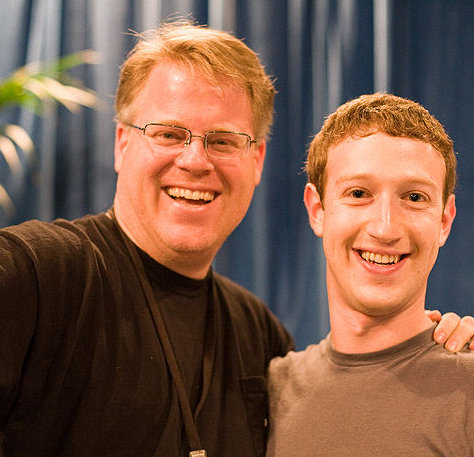11.18.10
Posted in Google, Mail, Microsoft at 2:12 pm by Dr. Roy Schestowitz

Facebook co-founder Mark Zuckerberg
with former Microsoft evangelist (source: Robert Scoble)
Summary: Over time, Facebook becomes more like a rebranding of Microsoft (another label on Microsoft services, akin to Yahoo! search in America)
Microsoft cannot create decent products. To quote Arno Edelmann, Microsoft’s European business security product manager, “[u]sually Microsoft doesn’t develop products, we buy products.” There are many examples. Hotmail, which failed after Microsoft had acquired it (in an attempt to buy its way into E-mail domination), is falling into oblivion despite overhaul attempts. On the Web, Microsoft continues to lose close to $3 billions every single year. That cannot qualify as a success story, can it? Even Windows figures are faked, but that’s another story.
Having found itself well behind the competition in social networks, Microsoft bought part of Facebook a few years back (see our posts about Facebook). Microsoft did attempt to buy the whole of Facebook, but a lot of people do not know this. On an inter-personal basis, Microsoft and Facebook are close friends too and both are patent bullies. Facebook’s founder hangs out with the world’s biggest patent troll, who is Microsoft’s former CTO.
In any case, just so that everyone keeps abreast of the latest developments around Microsoft Office Web Apps, it seems like there’s a true Microsoft-Facebook tag-team act which mimics Google Apps/Mail. Earlier this year we warned that Facebook was becoming an enemy of OpenDocument Format (ODF); instead of promoting open standards, Facebook decided to increase Microsoft lock-in and spread it further through its users. Here is news about that:
What Facebook Didn’t Mention: Microsoft Office Web Apps Come to New Messaging Platform
[...]
Facebook’s newly announced messaging platform will deeply integrate Microsoft’s Office Web Apps so that Facebook users can view Word, Excel and PowerPoint attachments without having to leave the site. Rumors about this integration started to make the rounds on the Internet last week. Oddly, though, Facebook didn’t mention this integration during today’s press conference and makes no mention of it in the official announcement on its corporate blog.
So without buying the whole of Facebook, Microsoft is already dangling Mark Zuckerberg (to whom Facebook users are “dumb fucks”) like a marionette, turning those “dumb fucks” as Mark calls them into Microsoft sheep. Glyn Moody has just challenged Mark to remember where he came from.
Microsoft’s Office documents are already the dominant formats used around the world – a position that Microsoft has worked long and hard to protect. The rise of ODF as an alternative is a hopeful sign that things can change, but let’s not delude ourselves: it is still used by only a small minority, and it is a constant battle to get the format accepted more widely.
That battle just got harder, thanks to Facebook’s decision to integrate Microsoft Office formats into Messages in this way. It makes it much easier to share Microsoft documents than those created with OpenOffice/LibreOffice, say. Given the huge following that Facebook has – especially amongst the younger generation – that’s a really big problem for free software and its future.
So we need to ask Mark Zuckerberg support open formats, too. Why do I think he might listen? Well, for a start, because of the following statement to be found on the Facebook developers site:
Facebook has been developed from the ground up using open source software.
Facebook might never have been created without the existence of zero-cost open source tools that allowed Zuckerberg and his mates to hack together some code easily and quickly when they came up with their idea. It wouldn’t have grown and flourished to its current impressive scale if it had needed to buy ever-more licences for the software that it uses to run its huge infrastructure.
Without Free software, Mark would probably still be in some dormitory or a drop-out after the disciplinary committee chastised and maybe prosecuted him for his offences on campus (this is a story which Facebook has successfully buried over the years, keeping it off the public eye).
Being a prisoner of Facebook increasingly seems like being stuck in a mythical “Hotmail 2.0″ that is just another platform with which Microsoft can manipulate and spy on (yes, Facebook gives its data to Microsoft) many Web users. Professor Eben Moglen is very concerned about Facebook, which he views as a top threat to freedom. █
Permalink
 Send this to a friend
Send this to a friend
Posted in Deception, Microsoft at 1:35 pm by Dr. Roy Schestowitz

Summary: Internet Explorer 9 (IE9) is said to be cheating in performance tests again
Microsoft relies heavily on benchmark fraud and we gave several examples such as this one from last year. Microsoft was at times threatened with lawsuits over these frauds.
Recently we learned that W3C entryism [1, 2, 3] may have also contributed to false Internet Explorer 9 (IE9) propaganda from the W3C. They got caught. Microsoft still relies on lies and cheating because IE9 is somewhat is a mess [1, 2, 3, 4] and its development team seems to be collapsing. A lot of money is spent brainwashing people, having them believe that this is not the case — that IE9 is actually a massive leap forward. Mozilla cannot match propaganda efforts by throwing hundreds of millions of dollars at perception campaigns. Mozilla just doesn’t even have that kind of money. What Mozilla can do, however, is help expose the lies which come out of Microsoft and Rob Sayre has just done that. Slashdot’s summary has the headline “Did Internet Explorer 9 Cheat In The SunSpider Benchmark?”
“A Mozilla engineer has uncovered something embarrassing for Microsoft – Internet Explorer is cheating in the SunSpider Benchmark. The SunSpider, although developed by Apple, has nowadays become a very popular choice of benchmark for the JavaScript engines of browsers.”
The original coverage of the original blog post starts by stating:
A Mozilla engineer has uncovered something embarrassing for Microsoft – Internet Explorer might be cheating in the SunSpider Benchmark. The SunSpider, although developed by Apple, has nowadays become a very popular choice of benchmark for the JavaScript engines of browsers.
Microsoft is a corrupt company (with many documents to prove it). Never expect fair benchmarks involving Microsoft. It ought to be noted that Microsoft is quite unique in that regard, so it’s not a scapegoat. █
“Microsoft did sponsor the benchmark testing and the NT server was better tuned than the Linux one. Having said that, I must say that I still trust the Windows NT server would have outperformed the Linux one.”
–Windows platform manager, Microsoft South Africa
Reference: Outrage at Microsoft’s independent, yet sponsored NT 4.0/Linux research
Permalink
 Send this to a friend
Send this to a friend
Posted in Deception, Europe, Microsoft, Patents at 2:41 am by Dr. Roy Schestowitz

Summary: Spanish translation of “Microsoft is Speaking ‘for’ Small EU-based Businesses to Promote Software Patents”
Eduardo Landaveri provides a translation of yesterday's post, adding (in English):
To the European & Third World Countries:
“The best regional software patent protection is the COMPLETE elimination of software patents”
Let us NOT stop unmasking these crooks! It’s the only way to counter mind share.
They’re like Himmler “Lie, lie, lie, something will remain”
If we continually unmask them they will have less chances to succeed.
The following Spanish translation is also available with better formatting as ODF and PDF (for distribution in south America).
EL BRUTAL monopolio de Microsoft Corporation no puede jugar de manera justa, limpia, ¿no? Por eso tenemos que ver lo que está haciendo en Europa en este momento y también prestar atención a quien esta pagando en esta ocasión para atacar a Linux (Microsoft pagó a SCO en numerosas ocasiones, aunque no siempre directamente).
Y he aquí como Microsoft brazo astroturfing, ACT -Asociación de Tecnología Competitiva [http://en.wikipedia.org/wiki/Association_for_Competitive_Technology], ya se interpone en la prensa británica:
La falta de acuerdo fue recibido con decepción por la Asociación para la Tecnología Competitiva (ACT)[http://www.v3.co.uk/v3/news/2273075/eu-patents-laws-innovation].
“No llegar a un acuerdo es un terrible revés para las PYME europeas, independientemente de su origen. Los beneficios de tener una patente única son muy superiores a las preocupaciones lingüísticas que se utilizan para bloquearlo “, dijo el presidente de ACT Jonathan Zuck.
“Esta feliz-ir-redondo es perjudicial para nuestra innovación y el crecimiento. Esperamos que los debates de la patente de la UE pronto de vuelta en el carril y no pospuesto a un tiempo incierto.
Barnier hizo eco de la decepción de las empresas, pero dijo que el acuerdo era “imposible” de alcanzar.
Jonathan Zuck [http://www.sourcewatch.org/index.php?title=Jonathan_Zuck] representa un monopolio: MICROSOFT, no a las pequeñas y medianas empresas. Ha sido un AstroTurfer durante muchísimo tiempo, después de haber comenzado una especie de carrera en la actuación (que es, obviamente, sigue haciendo, pero esta vez como un grupo de presión que se encuentra mucho). El artículo de arriba es un ejemplo de mala información de David Neal, quien también pretende que Barnier [1 [http://techrights.org/2009/12/18/eu-commission-for-michel-barnier/], 2 [http://techrights.org/2010/10/28/community-patent-and-barnier/], 3 [http://techrights.org/2010/11/06/eu-system-unified-wrt-uspto/]] tambíen sirve inteses de las PYMES, basado en el grupo de presión que otros que se hace pasar como si hablara por ellos. ¡Qué sinverguénzas (descarados) en la llamada “noticias oficiales”. Esta es la razón por la que evaluamos los blogs independientes, en particular Groklaw[http://techrights.org/2010/11/15/contrarian-sites/] tan o más importantes que la prensa corriente, y sobre todo como más importante que la prensa corporativa que sólo manipula hechos de acuerdo a sus propios intereses.
Para Zuck y sus secuaces, el trabajo se llevó a cabo (la “mente compartida” ganada por la gente mala que Microsoft contrató para hacerlo), “inyectando” desinformación en la prensa. David Neal solo se la tragó,a sabiendas, sin hacer suficiente investigación usualmente, al igual que una gran cantidad de canales de “noticias” como Fox eco los grandes grupos de presión petroleros con respecto a las cuestiones climáticas.
“Para Zuck y sus secuaces, el trabajo se llevó a cabo (la “mente compartida” ganada por la gente mala que Microsoft contrató para hacerlo), “inyectando” desinformación en la prensa.”De todas formas, presionando un poco nos encontramos con el presidente de la FFII (Fundacion por una “Libre” Infraestructura Informatica)–con el descaro de definirse como “Dedicado a la creación de un “MERCADO LIBRE” en tecnología de la información, mediante la eliminación de las barreras a la competencia y de trabajo hacia el sistema de patentes sana”- muestra que Microsoft también hace la presión [http://twitter.com/zoobab/statuses/2691055317155841] junto con la Asociación de Tecnología “Competitiva” (ACT):
Los caraduras de Microsoft hablan en nombre de las PYME europeas: “Es muy costoso, especialmente para las medianas y pequeñas”–lease si va a ser cóstoso para nuestro MONOPOLIO y nuestros asociados porque no vamos a recibir dinero por licencias y regalías por “NUESTRAS” invenciones y tecnologías- Ohh, pobrecito MICROSOFT-”PYMES de Europa, Latino America y Africa, dejénos meterles la yuca, muevanse que NOSOTROS los representamos”
La cita [http://www.euractiv.com/en/innovation/italy-and-spain-block-eu-wide-patent-talks-news-499638] esta aquí y el portavoz es Jan Muehlfeit, presidente europeo de Microsoft – a quien le escribió en [1 [http://techrights.org/2009/02/17/ms-patent-roadshow-acacia/], 2 [http://techrights.org/2009/03/21/ms-affair-uk-and-ireland/], 3[http://techrights.org/2009/10/21/fud-from-ed-gibson-jan-muehlfeit/], 4 [http://techrights.org/2009/10/26/idc-gartner-corruptible/], 5 [http://techrights.org/2009/12/07/microsoft-and-aarp-pr/], 6 [http://techrights.org/2010/03/20/microsoft-pr-for-eu-swpat/]] (sólo que no mencionan que es un ex comunista, 1 [http://techrights.org/2008/03/26/czech-republic-msooxml/], 2 [http://techrights.org/2008/02/04/tax-and-game-of-economics/] y por eso lo contrataron, sirve a Microsoft con la fidelidad que sirvió a sus antiguos amos). Comentamos sobre el artículo anterior, justo cuando la primeras noticias corrían [http://techrights.org/2010/11/12/open-door-to-uspto-eu-patent-scrapped/] y el presidente de la FFII la escribe a otro refuerzo en la Unión Europea de Patentes[http://twitter.com/zoobab/statuses/2837413504225280] (un compatriota suyo).
“Vincent Van Quickenborne, ¿Sabe usted si el Parlamento belga dio un mandato a la Presidencia belga de negociar en materia de patentes? Cualquier enlace?”
Barnier y el destinatario de arriba (Vincent Van Quickenborne [1 [http://techrights.org/2010/10/06/european-maximalists/], 2 [http://techrights.org/2010/10/05/vincent-van-quickenborne-on-swpats/], 3 [http://techrights.org/2010/10/12/quickenborne-and-bsa-help-promote-swpats/], 4[http://techrights.org/2010/11/10/european-patent-lobby-in-wsj/]]) son como los últimos McCreevies[http://techrights.org/wiki/index.php/Charlie_McCreevy], cuya función parece ayuda a las empresas multinacionales, hce mucho daño a las PYMES europeas,(no bufetes de abogados), mientras que astutamente finge ayudarlos. Aquí es un blog abogados de patentes “culpar a España para hacer lo correcto[http://ipkitten.blogspot.com/2010/11/spanish-fly-in-ointment-spoils-eu.html]:
A través de un número de fuentes, incluyendo a su amigo el IPKat Stephanie Bodoni (Bloomberg) llega la noticia de que la Unión Europea [era de esperar, dicen algunas personas] no logró encontrar un compromiso sobre com hacer más fácil de obtener protección regiónal de patentes [haga clic aquí[http://ipkitten.blogspot.com/2010/11/spanish-fly-in-ointment-spoils-eu.html] para] los últimos detalles, de la gran decepción del comisario de mercado interior Michel Barnier.
Perfectamente suficiente, de patentes como “monopolio” parece haberse convertido en algo así como una norma de percepción porque los estados primer comentario: “Si el costo de realizar transacciones comerciales en un país extranjero es mayor que en su propio país, entonces debe ser a su ventaja que ser puede dar el lujo de obtener un monopolio local, y no sólo en el extranjero”.
Carlo Piana, un italiano que es empecinado respecto a la eliminación de las patentes de software, escribe[http://techrights.org/2010/05/25/carlo-piana-on-swpats/]:
“Las patentes de software son una mala idea.” “Las patentes de software son una mala idea.” Ahora repitánse a sí mismos mil veces, por favor!
Piana había este tweet retweeted por un montón de gente. Los italianos también ayudaron a desbaratar la patente europea.
Ahora que Microsoft presiona por RAND -Licencias Razonable y “No-Discriminatoria”-(como la RAND en OOXML[http://techrights.org/2010/11/12/pseudo-standards-rand-lobby/]) las noticias sobre la Patente Europeas son muy importantes. Tal vez Europa se las arregló para expulsar a los grupos de presión y seguir los pasos de la India[http://techrights.org/2010/11/16/india-swpats-and-rand/].
Axel H. Horns-abogado de patentes europeo- que está a punto de beneficiarse más por un sistema mas agravado por patentes, dice que la iniciativa de legitimar patentes los llamados “peer-to-patentes[http://www.ipjur.com/blog2/index.php?/archives/183-Second-Peer-To-Patent-Pilot-Phase-Has-Begun-UK-IPO-Might-Join-Later.html]” (¿qué hay de Peer-NO-A-patente?), es posible que llege al Reino Unido .
El punto a proyectos de Patentes (también conocido como el proyecto de la Patente Comunitaria de Revisión) es una iniciativa que busca la reforma del sistema de patentes al reunir la opinión del público de una manera estructurada y productiva. Peer-to-patente tiene por objeto mejorar la calidad de las patentes concedidas por la USPTO conectar a una red abierta de expertos en la materia.
El presidente de la FFII ha respondido [http://twitter.com/zoobab/statuses/3221085235453952] a este por escrito:
“USPTO para impulsar más resistente a las patentes de software a través del Programa de Intercambio de Patentes: http://ur1.ca/2c2fx”
A qué intereses “Peer-To-Patentes” sirven de todos modos? IBM tal vez? IBM es la inyección de dinero en Peer-To-Patentes de este año, no es sorprendente [http://techrights.org/2009/08/12/ibm-promoting-software-patents/] que (había una divulgación en las últimas semanas y lo cubrimos en el momento). Este no es el enfoque correcto para estar tomar, desde luego no en Europa. █
Permalink
 Send this to a friend
Send this to a friend






















 Content is available under CC-BY-SA
Content is available under CC-BY-SA